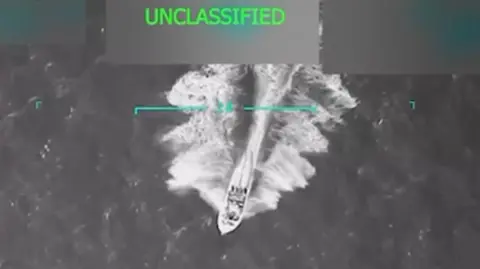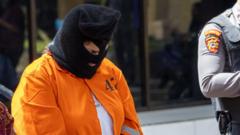The text message came from Dubai with a Santa emoji: 'OK lads. No need for luck. Really this couldn't be any more straightforward. Just relax and this will all be over soon.'
This message was sent to a fisherman from Ukraine and an unemployed man from Teesside, who were on their way to the Irish Sea to collect cocaine from the cargo ship, MV Matthew. Their operation aimed to traffic over 2.2 tonnes of cocaine into the UK and Europe but ended in failure, with authorities striking a significant blow against one of the world's drug cartels.
Eight men were sentenced to a total of 129 years in prison, and the cocaine was successfully destroyed. Despite this success, law enforcement agencies in Europe acknowledge their challenges in keeping pace with the rising volume of cocaine shipments from South America.
Sjoerd Top, director of the Maritime Analysis Operations Centre (MAOC), noted that there were over 100 drug trafficking vessels that went unchallenged last year due to insufficient surveillance capabilities. They monitor around 600 ships daily, but the increase in production and shipment of cocaine presents a formidable challenge.
UK users consumed approximately 117 tonnes of cocaine last year, and cocaine-related deaths have surged tenfold since 2011, reflecting an alarming trend in substance abuse in the region.
The drug trafficking strategies employed by cartels have evolved, utilizing drop-off methods where drugs are transferred from larger vessels to smaller crafts at sea to evade detection. Ireland's geographic positioning, with its extensive coastline, has made it a preferred entry point for drug cartels, particularly because it shares an open border with the UK.
Some experts, including former naval commanders, have voiced concerns over Ireland’s defense capabilities, citing minimal funding and resources that hinder effective maritime policing.
The bust of the MV Matthew highlights ongoing vulnerabilities within Ireland’s defense apparatus, despite significant funding increases promised by the Irish government. Reports state that drug cartels, including the notorious Kinahan group, continue to exploit these weaknesses, emphasizing the need for countries throughout Europe to bolster their collective efforts against drug trafficking.
'If I were in narcotics, I'd be rubbing my hands together,' stated Eugene Ryan, a former fleet operations commander in the Irish navy, indicating the persistent and adaptive nature of the drug trade. 'Even if several shipments are intercepted, a significant volume will still reach the market.'

















